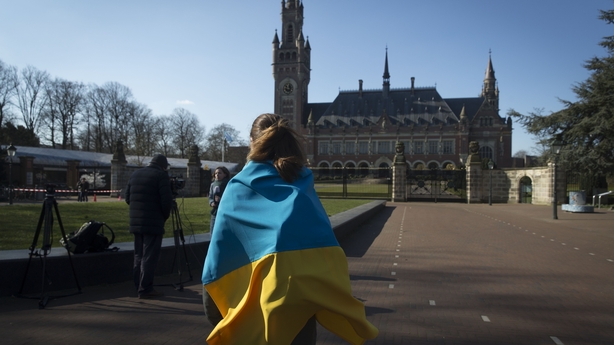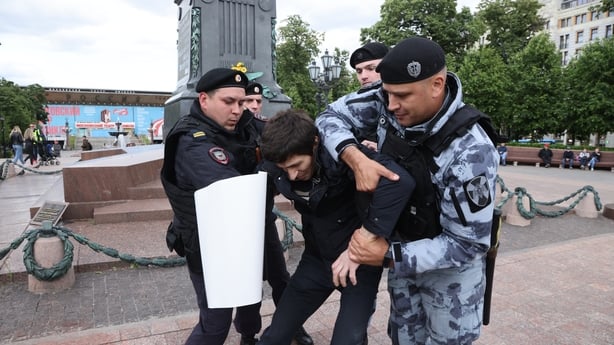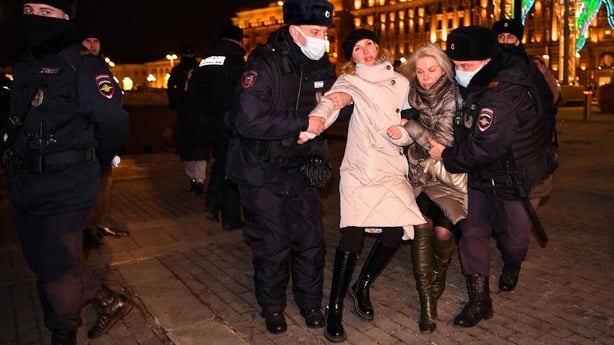Russia called on the United Nations' highest court in The Hague today to throw out what it said was a "hopelessly flawed" case challenging Moscow's argument that its invasion of Ukraine was carried out to prevent genocide.
The Russian request was made at the start of hearings dealing with the jurisdiction of the International Court of Justice (ICJ), also known as the World Court.
Russia says Ukraine is using the case as a roundabout way to get a ruling on the overall legality of Russia's military action. Experts say a ruling in Ukraine's favour would not stop the war but could impact future reparations payments.
Ukraine brought the case days after the Russian invasion on 24 February last year. Ukraine argues Russia is abusing international law by saying the invasion was justified to prevent an alleged genocide in eastern Ukraine.
Ukraine says there was no risk of genocide in the east, where it had been fighting Russian-backed forces since 2014, and that the genocide treaty does not in any case allow an invasion to stop an alleged genocide.

Russian officials continue to accuse Ukraine of committing genocide. Russia today repeated allegations that the "Russophobic and neo-Nazi regime in Kyiv" was using the UN's 1948 Genocide Convention, to which both countries are a party, as a pretext to "drag" a case before the court.
The hearings, set to run until 27 September, will not delve into the merits of the case and are instead focused on legal arguments about jurisdiction. The convention defines genocide as crimes committed "with intent to destroy, in whole or in part, a national, ethnical, racial or religious group, as such."
"Ukraine insists no genocide has occurred," Russia's agent to the court, Gennady Kuzmin, said in opening remarks.
"That alone should be enough to reject the case. Because according to the court's jurisprudence, if there was no genocide, there cannot be a violation of the Genocide Convention."
Mr Kuzmin concluded that "Ukraine's legal position is hopelessly flawed and at odds with the long-standing jurisprudence of this court" and called on the judges to dismiss the case.
Ukraine has already cleared one hurdle as the court decided in its favour in a preliminary decision in the case in March last year. Based on that, the court ordered Russia to cease military actions in Ukraine immediately.
Russia has so far ignored the ICJ's orders to stop its military actions and the court has no way of enforcing its decisions but experts say they may have implications for compensation payments after the war.
Ukraine will tomorrow present arguments on why the court does have jurisdiction to have the case continue. The court will also hear from 32 other states, all supporting Ukraine's argument that the court has jurisdiction to move the case forward.

Human rights in Russia have 'significantly deteriorated' - UN expert
Elsewhere, the human rights situation in Russia has significantly deteriorated since it invaded Ukraine in February last year, a UN expert said today, describing a "systematic crackdown" on civil society and calling for redress.
The report by Special Rapporteur Mariana Katzarova alleges that Russian authorities have carried out mass arbitrary arrests of critics of the war and says those detained risk death due to the "persistent use of torture and ill-treatment".
It is the first time the 16-year-old UN Human Rights Council (HRC) has been mandated to examine the record of one of its so-called "P5" members, which hold permanent seats on the Security Council.
Kremlin spokesperson Dmitry Peskov said he could not comment for the time being because he had yet seen the report.
Russia has previously called criticism of its domestic rights record unfounded and denied targeting civilians in Ukraine, where it says it is carrying out a "special military operation" to destroy military infrastructure.
"(The expert) has documented the recent legislative restrictions that are being used to muzzle civil society and punish human rights activists and others for their anti-war stance," the report said in its conclusions.
"The often-violent enforcement of these laws and regulations has resulted in a systematic crackdown on civil society organizations that has closed civic space and independent media," it said.

Since Russia's invasion of Ukraine, Moscow has passed stronger laws to punish dissenters and perceived traitors.
The UN expert Ms Katzarova, a former journalist from Bulgaria who led investigations during the two Chechen wars for Amnesty International, also referred to attempts by Russia to obstruct her mandate, saying such actions showed "a lack of political will to uphold its human rights obligations".
Russia has previously said it would not cooperate with the probe.
A debate on the report's findings is expected at the HRC's ongoing session in Geneva on Thursday.
European Union countries are set to seek a renewal of Ms Katzarova's mandate. More than a dozen non-governmental organisations have written to diplomats in Geneva asking them to support the renewal, a letter showed.

